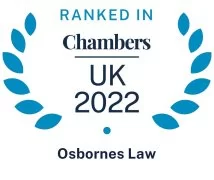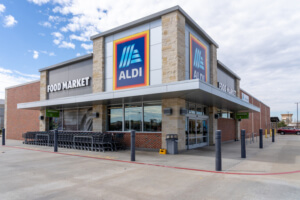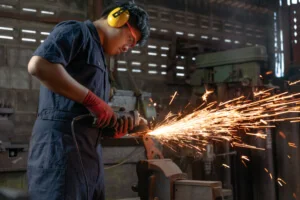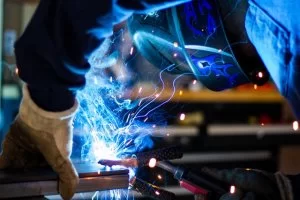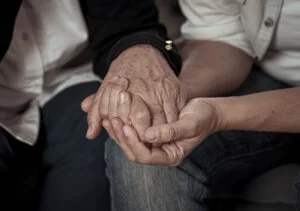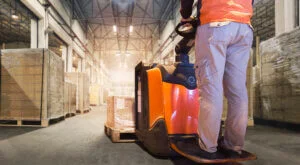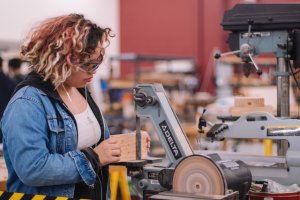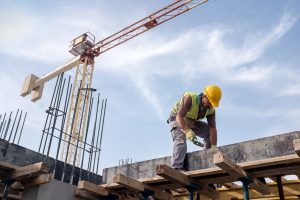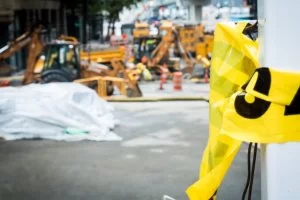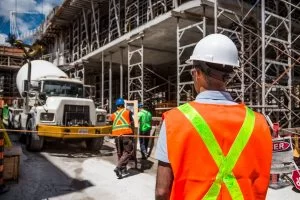Industrial Injury Claims
Factory Accident Claims Solicitors
Our team of industrial accident solicitors specialise in Industrial Injury Claims. Our expert solicitors are highly experienced in handling factory accident claims, ensuring you receive guidance and support throughout the process of claiming compensation.
“They punch well above their weight. The quality of service they provide equals that of any of the larger top-name firms in this area.”
“Fielding a first class, very well resourced team of litigators, the personal injury department at Osbornes is rated for its diverse workload of complex, high-value injury claims.”
Factory accident claims: A guide to industrial injury
The manufacturing industry employs 10% of the British workforce but accounts for 25% of all fatal workplace accidents and 16% of reported accidents at work, according to the Health and Safety Executive (HSE). The factory can be a dangerous environment and whilst there have been improvements in worker safety over recent decades there is still room for improvement. The most common factory injuries include those caused by faulty machinery, slips and trips, and hazardous working conditions.
The main source of safety improvements has been the imposition of health and safety regulations, including European legislation over the last 20 years, which was built on the 1961 and 1974 Factories Acts. This legislation covers a wide area of activities in the workplace and ensures that risk assessments are at the centre of operations.
If you’ve been injured in a factory accident, you may be entitled to compensation. Making a factory accident compensation claim with Osbornes Law can help you recover damages and get the support you need.
What is a factory accident?
A factory accident is any unexpected incident that occurs within a manufacturing or industrial setting, resulting in injury or harm to an employee. These accidents can range from minor issues, such as cuts and bruises, to more serious injuries like crush incidents, amputations, or even fatalities.
Factory accidents often happen due to:
- Faulty or poorly maintained machinery
- Lack of proper health and safety protocols
- Inadequate staff training
- Unsafe or hazardous working conditions
Employers have a legal duty to provide a safe working environment and to implement effective safety measures. When they fail in this duty, injured workers may be entitled to pursue a factory accident compensation claim.
Whether the injury is minor or severe, prioritising workplace safety is essential, for both employers and employees, to help prevent accidents and protect everyone’s well-being.
What are common causes of industrial injuries?
Industrial injury claims typically arise when employers fail to uphold their legal responsibility to provide a safe working environment. Some of the most common causes include:
- Inadequate training on how to safely operate machinery and follow safety protocols (Can lead to crush injuries or broken bones)
- Hazardous working environments, such as poor lighting, wet or uneven floors, or obstructed walkways (Slips, trips and falls can result in fractures or head injuries)
- Faulty or poorly maintained equipment, or the misuse of tools and machinery (Often linked to crush injuries, amputations or broken bones)
- Exposure to harmful substances without proper protective measures (Risk of chemical burns or respiratory injuries)
- Manual handling risks, such as heavy lifting or repetitive strain tasks (Can cause musculoskeletal injuries or back pain)
- Lack of appropriate personal protective equipment (PPE) or failure to enforce its use (Leads to preventable injuries like burns, eye damage, or cuts)
Employers are legally required to carry out regular risk assessments and enforce proper safety regulations. When these responsibilities are neglected and an employee is injured as a result, they may have the right to make an industrial accident claim and seek compensation for their injuries and losses.
The process of making a claim can be complicated, particularly when it involves long-term health issues or proving employer negligence. That’s why it’s important to seek advice from specialist personal injury solicitors. The team at Osbornes Law can guide injured workers through the legal process, help gather the necessary evidence, and work to secure fair compensation for injuries sustained due to unsafe working conditions.
What is the law relating to industrial injuries?
In the UK, the legal framework for dealing with industrial injury claims is covered by:
- The Health and Safety at Work Act 1974
- The Management of Health and Safety at Work Regulations 1999
- The Workplace (Health, Safety and Welfare) Regulations 1992
- The Personal Protective Equipment at Work Regulations 1992
- The Provision and Use of Work Equipment Regulations 1998 (PUWER)
- Reporting of Injuries, Diseases and Dangerous Occurrences Regulations 2013 (RIDDOR)
- The Industrial Injuries Disablement Benefit
These regulations apply across England, Wales, and Northern Ireland, and Osbornes Law assists clients in all these regions.
How do you make an industrial injury claim?
- First and foremost, get medical treatment for your injury. This is crucial not only for your health but also because medical records will serve as important evidence for your accident compensation claim.
- Notify your employer about the injury as soon as possible. Most companies have a procedure in place for reporting workplace accidents. This report will act as an official record of the incident.
- Keep detailed records of all medical treatment related to your injury. Document the circumstances surrounding your injury including dates, times, location, how the injury occurred, and any witnesses. Keep records of any expenses incurred as a result of the injury, including travel costs to medical appointments, and any lost earnings.
- Call your our industrial injury lawyers on 020 7485 8811 or complete the enquiry form below. Once you contact us, we begin by sending a formal letter of claim to the defendant insurers.
- One of our lawyers will arrange a time to speak with you so we can find out all the details and understand exactly what has happened. Once we have this information, we’’ll be able to advise you on the best course of action. Our goal is securing compensation for injured workers, and we handle claims on a no win no fee basis, so you know you won’t pay unless your claim is successful.
- Contact us today for a free initial consultation with a qualified solicitor to discuss your factory accident claim.
Real-life factory accident claim
Osbornes made an Industrial Injury claim for Mrs V, a Bulgarian lady who worked in an industrial bakery in London and spoke little English. She was operating a machine on the production line, a machine she was trained on and had no problems with before, when suddenly and without warning part of the machine, a metal block, swung out and hit her on the head, throwing her across the factory floor and knocking her out. She was unable to say what the part was and how or why it ejected from the machine and she had no details of witnesses. Proving fault on the part of her employer would have been extremely difficult, but because the machine had malfunctioned the employers were strictly liable and so she was compensated for the head injury that interfered with her work for the next three years.
What types of industrial injuries can I claim for?
We have helped clients claim compensation for a wide range of industrial injuries including:
- Arm Injury Claims
- Back Injury Claims
- Elbow Injury Claims
- Face Injury Claims
- Finger Injury Claims
- Foot Injury Claims
- Hand Injury Claims
- Hip Injury Claims
- Knee Injury Claims
- Leg Injury Claims
- Neck Injury Claims
- Shoulder Injury Claims
- Wrist Injury Claims
How much compensation will I receive for my claim?
No two claims are the same so we can’t say how much compensation you will get for your claim. Compensation is split into two parts:
- General damages (based on the severity of injuries and the length of time it takes for you to recover)
- Special damages (covering current and predicted out of pocket expenses as a result of the injury – such as loss of property, medication, aids and equipment, treatment, travel and loss of income).
While we might not be able to say how much compensation you can expect to get, we are experienced in a wide range of industrial injury claims and should be able to give you an estimate, when we speak.
How our industrial injury lawyers can help
At Osbornes Law we have one of the largest industrial injury teams in London. Our solicitors have helped thousands of people make no win no fee claims to get their lives back on track following serious injuries. We have built up a strong reputation for representing clients with the following injuries:
Osbornes Law is an active supporter and campaigner for the Association of Personal Injury Lawyers (APIL) – an organisation fighting for the rights of injured people. Other organisations supported by the team include Headway East London, Spinal Injuries Association and the Limbless Association.
To speak with one of our solicitors, contact us by:
- Filling in our online enquiry form; or
- Calling us on 020 7485 8811
FAQs
What makes machinery injuries in factories different from other workplace accidents?
Machinery injuries are one of the few situations in UK law where strict liability applies. This means that if a machine is defective and causes injury, regardless of fault, the employer is automatically liable to pay compensation.
What is strict liability?
Strict liability means there is no need to prove that the employer was at fault. The law assumes liability exists if a defective machine causes harm. This legal protection is in place because employees may struggle to prove employer negligence in such cases.
Why does strict liability apply to machinery injuries?
There is often an imbalance of power between employers and employees. Employees may not have access to technical knowledge or evidence about how or why a machine failed. Strict liability helps protect workers from this mismatch by holding employers accountable for machine safety.
Does strict liability apply to all types of workplace injuries?
No, most workplace accidents still require proof of employer negligence. This means the employee must show how the employer failed to meet legal duties or created unsafe conditions that led to the injury.
What duties do employers have to protect factory workers?
Employers must follow health and safety regulations, which include:
- Ensuring machinery and equipment are safe to use
- Conducting proper training for workers
- Organising the workplace to reduce risks (e.g., separating pedestrian walkways from vehicle routes)
- Performing regular risk assessments
Are there rules about vehicles like forklifts in factories?
Yes. Regulations require that vehicles such as forklifts and pallet trucks operate in designated areas and do not pose a risk to pedestrians. Many injuries occur when these rules are ignored, allowing vehicles to move through shared spaces.
How are hazardous substances regulated in factories?
Special regulations control the use of hazardous or toxic substances to protect workers’ health. Employers must ensure proper handling procedures, provide protective equipment, and assess health risks regularly.
What is the role of the Health & Safety Executive in a factory?
The Health & Safety Executive is responsible for overseeing workplace safety, ensuring compliance with regulations, conducting risk assessments, and promoting a culture of safety to prevent accidents.
"Rachael represented us for both on the sale of our old property and the purchase of our new property. She has been absolutely fantastic. She has always explained clearly every aspect of the process, gave us extremely valuable and professional advice and most importantly, she has given us time via zoom and phone when we needed it the most. She has been so approachable and flexible and this was of great value to us. We would certainly recommend Osbornes to anyone that is willing to buy/sell a property."
"Edward Taylor works to an exceptionally high standard throughout every stage of the legal process."
You kept me informed at every stage of the process, were easy to speak to and I feel you went beyond your job on a couple of occasions in order to deliver great results. You were very professional and efficient in all aspects of your work and I feel very lucky that I chose you to deal with my case. I will be certainly recommending you in the future to anyone who needs your help.
"I am extremely grateful to Blanca for her exceptional legal representation in my personal injury case. Her expertise, attention to detail, and genuine care were evident throughout the entire process. She was very professional, responsive and provided sound advice throughout. I highly recommend their services to anyone in need of a dedicated and skilled personal injury lawyer."
An excellent solicitor who is very experienced, straightforward and has a sensible way of thinking about a case.
Client Stories & News InsightsVIEW ALL
- 9.7.2025
Warehouse Worker Fights Aldi’s False Dishonesty Claims
Aldi’s worker suffers ‘mental torture’ after the supermarket giant falsely accuses him of lying In a shocking case that...
Read more - 5.6.2025
Migrant Workers Face Greater Risk of Workplace Accidents
Why migrant workers face greater risk of workplace accidents? Foreign workers in the UK are statistically more likely to experience...
Read more - 22.10.2024
£75,000 Settlement for Head Injury at College
Accident During a College Class Eloise Mears, Solicitor at Osbornes Law, represented a student who sustained a head injury while...
Read more - 26.4.2024
Head Injury Following Slip at Work
Client who slipped at work obtains a good settlement Laura Swaine recently settled a work accident claim for a client...
Read more - 26.4.2024
Six-Figure Settlement for Head Injury at Work
Settlement for a client injured at work Laura Swaine recently settled a claim for a client who was injured while...
Read more - 14.3.2024
Strawberry Picker Receives £10,500 After Accident at Work
Incident in the Strawberry Field Our client was at work, walking in the field and carrying cages with strawberries, when...
Read more - 13.3.2024
Accident at Work Compensation Examples
Factory Worker Receives £14,000 for Hot Water Burns Our client was working in a food producing factory. He was injured when...
Read more - 13.2.2024
5-figure Payout for Death of Hungarian Lorry Driver
Hungarian lorry driver tragically dies Siobhan McIvor, a Partner and Personal Injury lawyer, has successfully settled a fatal accident compensation...
Read more - 6.12.2023
Accident at work claim settled for Romanian driver
Siobhan McIvor, a Partner in the Personal Injury Department, has successfully settled an accident at work claim arising from an...
Read more - 5.12.2023
£75,000 Compensation After Accident Leads to Blood Clot
£75k Settlement Following Injury at Work Serious injury lawyer, Blanca Diego Casas recently represented an individual who suffered serious medical...
Read more - 23.11.2023
Accident at work claim settled for Hungarian factory...
Forklift trucks are a common cause of warehouse injury claims due to human error on the part of the forklift...
Read more - 11.4.2023
£250,000 settlement for client injured in forklift accident
Sophie Davies, a specialist personal injury lawyer at Osbornes Law, recently represented a client who suffered life-changing injuries following a...
Read more - 17.11.2021
£100,000 settlement for tripping at work
Osbornes Law secures £100,000 settlement for Hungarian woman who tripped over a shopping bag at work Siobhan McIvor, a Partner in...
Read more - 17.11.2021
£165,000 settlement for factory accident
Siobhan McIvor, a Partner in the Personal Injury Department of Osbornes Law, has settled a £165,000 accident at work claim, with...
Read more - 31.8.2021
Kitchen Accident Claim
Our client, a hospitality supervisor instructed Osbornes after he slipped and fell on oil and food debris on the floor...
Read more - 18.5.2021
Construction Site Accident at Work
Our client suffered numerous fractures to their left leg requiring surgery following a work accident on a construction site. He...
Read more - 18.5.2021
Compensation for Amputation on Construction Site
Our client worked as a carpenter/bricklayer on a building site at a residential property in North London. He was...
Read more - 15.10.2020
Fatal Accidents In The Workplace
A new article from the BBC takes a looked at fatal accidents at work. The report states that since 1981, there...
Read more - 2.9.2020
Lasting damage to ankle following construction accident settles...
Sam Collard, a Partner in the Osbornes’ catastrophic injury team, recently settled a construction accident claim for a Romanian man...
Read more - 30.7.2020
Self Employed Accident at Work Claims
Understanding self employed workers’ rights As a self-employed worker, understanding your rights after a workplace accident is crucial. While your...
Read more - 13.8.2019
Fatal Accident Conviction Highlights Health & Safety
Construction bosses guilty of gross negligence manslaughter Conrad Sidebottom, 46, and Richard Golding, 43, were jailed for their part in causing the...
Read more
Our Personal Injury Team View the whole team
Rob Aylott
 Partner
Partner
Personal Injury SolicitorsSam Collard
 Partner
Partner
Personal Injury SolicitorsSophie Davies
 Partner
Partner
Personal Injury SolicitorsLaura Swaine
 Partner
Partner
Personal Injury SolicitorsNicola Hall
 Senior Associate
Senior Associate
Personal Injury SolicitorsAndrew Middlehurst
 Senior Associate
Senior Associate
Personal Injury SolicitorsView the
whole team

